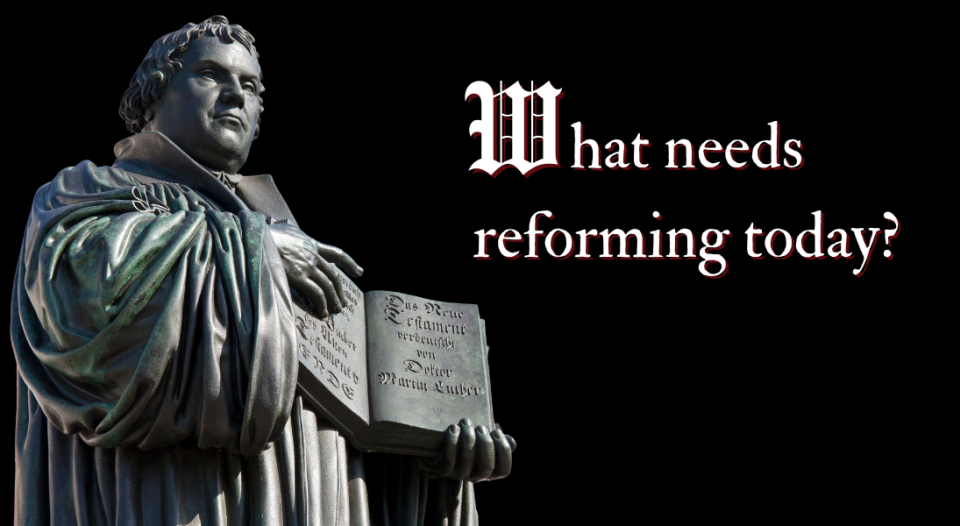Sunday after Sunday, we play musical chairs in the pews, recite familiar hymns and watch the colors of the paraments change, fading into the background like the holidays they represent. We move to the steady rhythm of the church calendar, which marks the seasons, honors the saints and pauses for holy times.
On Reformation Sunday, we don our red garments and stand firm in our Lutheran heritage, joining the hymnist in singing “A Mighty Fortress Is Our God.” But once the service ends and we step outside the church, we tend to forget until the following year. The vibrant red fades, the resounding song lowers in volume and the symphony of daily life begins to blare. We forget to be the church.
We prioritize our to-do lists, routines and other people over God. Those once-holy rhythms slip by unnoticed, crowded out by growing calendars, commitments and a cacophony of concerns. More than 500 years later, the vitality of the Reformation often feels dulled, not because the Spirit has faded but because we’ve grown numb to the call.
This raises an important question: Is the Reformation still relevant more than 500 years later? How does the Reformation continue to impact the lives of people in our church today? How do we view the Reformation not as a holiday that fades into the background but rather as the promise of salvation for all?
Reformation Sunday isn’t just a special day—it should be marked as a holiday. We are called to embody the fire of the Reformation promise, which tells us that God’s radical grace is still accessible. Reformation Sunday is more than a familiar tune—it’s a profound act of religious freedom that allows us all to be in one accord and know that we are loved, not because of our actions but because of who we are.
The Reformation reminds us that we are perfectly imperfect and encompassed by this radical grace that gives us chance after chance, forgiveness after forgiveness, and meets us with love when we feel we aren’t deserving.
More than a day
But the Reformation isn’t confined to a single day in October—it is lived out whenever we proclaim faith alone, Scripture alone and grace alone. It is lived out as we grapple, welcome and question reform within our policies and bylaws to reflect Jesus’ teachings.
When we, as a community, stand up and speak boldly to advocate for change, we become the voice for those silenced by systems. This is the Reformation in everyday life, the reform church that accepts everyone and allows all of us to have accessible faith. It’s in the way we treat our neighbors, advocate for justice and show compassion to those in need.
The Reformation happens in everyday discipleship as we reexamine how Scripture shapes our lives and how we live it out. It occurs in the conversations we have with one another when we care for them, when we choose love over fear, courage over complacency, truth over deception and grace over judgment. It’s found in the small but mighty faithful choices we make to serve, to forgive, to grow and to lead. That is where the Spirit reforms the church.
All of us, as a community, are responsible for living out these doctrines and our faith so that is the first thing people encounter when they meet us.
The heart of the Reformation isn’t history, to be stowed away as a relic, but should reflect our footsteps as we follow Christ. It can be found in the pattern of our liturgy and the hum of our hymns. It’s woven throughout the folds of our churches.
The Reformation isn’t confined to a single day in October—it is lived out whenever we proclaim faith alone, Scripture alone and grace alone.
I implore you not to let the red fade and the Reformation flame flicker and be extinguished. Let us see the reform of today and know that love extends through our past, present and future. We must embody the same courage as did theologian and forefather Martin Luther, challenging the systems that fail to reflect the church and God’s mercy.
May we see that the reform is in equality, kindness and, most important, care for our neighbor and the way we speak, not one day out of the year but every day. The church is called to be reformed.
The Reformation is not just a passing event. It’s more than a pile of discarded red clothing items lost in the hamper Sunday night or the faint memory of the story of a courageous German theologian guided by God. It was meant to be not just commemorated but continued. It is a living tradition that challenges us to ask what needs reforming today.
Where is the Spirit stirring around you? How do we proclaim the gospel in a way that embodies a liberating and healing now? The Reformation is not a historical event but a living tradition that continues to shape our faith and lives today.
So let us nail truth to every door, knock without fear and be the church, courageous, reforming and alive today.




